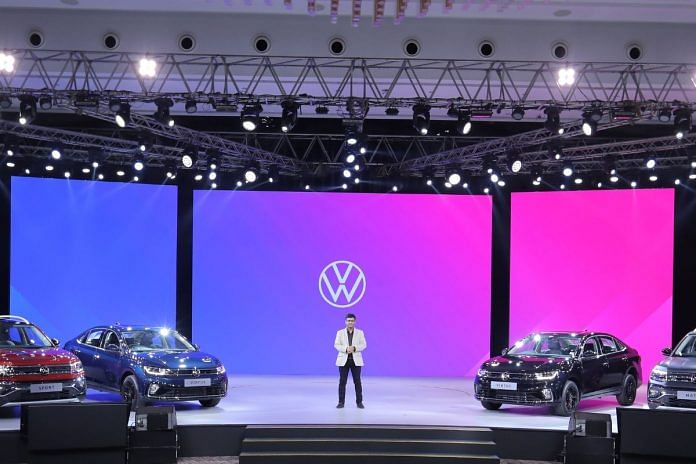Volkswagen India Brand Head Ashish Gupta stood on a hotel stage in Kerala’s Kochi, showcasing a new variant of the German automobile giant’s Taigun SUV and Virtus sedan. While the cars are quite different – one has an outdoorsy feel, the other is a much-anticipated black variant – both vehicles are specced out with exciting features and lie on the higher end of the spectrum. “The average ticket price for a car we sell in India has gone from Rs 6-7 lakh five years ago to Rs 16-17 lakh today,” Gupta told me later.
Focus on ‘premiumisation’
One clear reason for the increase in prices is inflation. According to Gupta, data shows that nearly 40 per cent of the four million cars sold in 2022 had an ex-showroom price of over Rs 10 lakh. “We expect that number to be over 50 per cent in 2023, as customers want bigger and better vehicles. They want increased digital features, and yes, inflation and the depreciation of the rupee are factors for increased prices.” It also helps that with robust demand and long waiting periods for cars, the term ‘discount’ has almost disappeared from the lexicon of Indian car showrooms, although you can still get discounts on slow-moving models.
Sure, part of the reason for Volkswagen’s average car price shooting up has been that it does not sell its cheaper hatchback Polo anymore. But Gupta also adds that the most feature-loaded variants account for nearly 40 per cent of the carmaker’s sales. The model just below the top one accounts for an equal amount. And it isn’t just Volkswagen—this is a reality for automobile manufacturers across the board, from Maruti-Suzuki to Mahindra to Mercedes. Consumers no longer want to miss out on new features—even if they do not make sense (like sunroofs) in India. You would not want to stand under the scorching sun in India in May, but evidently, on cars that offer variants with a sunroof and without, those with a sunroof account for over half the sales volume. Some carmakers now offer sunroofs across a model’s variants, such as on the Hyundai Alcazar.
“Truth be told, the entry-level model sticker price is just to get people into showrooms,” Hyundai India’s Chief Operating Officer, Tarun Garg, told me. “But even on our affordable cars like the i10 Nios and the Aura, sales of the entry variants are reducing [to] less than 10 per cent. According to Garg, even first-time car buyers want nice-looking LED lights, a state-of-the-art audio system and an edgy touchscreen front panel. He also said that while some buyers still go out to accessorise their vehicles, the number is reducing. “We offer branded Bose audio on our top variants. It isn’t easy to find such a good audio system in the aftermarket.”
Also read: Has your feature-laden car made you a lazy driver? Those ventilated seats, reverse cameras
Indians crave features
There has also been a significant ‘variant bloat’ in the market. Some popular car models in India offer as many as 100 potential variants when you consider colours and engine options. Manufacturing complexity gets easier to manage through software: soon after an order is placed in a showroom, a carmaker’s manufacturing software system does not just update the order on the line but at every vendor as well.
And at the same time, the fact is that a more feature-loaded and expensive model means more money all around – for the salesperson at the dealership to shareholders. So it isn’t just Volkswagen India that has seen the average ticket price of each vehicle shoot up. Even Maruti-Suzuki is witnessing a surge in demand for high-end models of their entry-level hatchbacks—which is why even the Alto now comes with a touchscreen interface.
“A car is a highly emotional purchase for customers. You are spending a lot of money, taking out a loan after all, so it is easier to upsell certain features, whether they are really useful or not in the long-term,” said the marketing chief of a leading car manufacturing company. Customers seem to be really eyeing Advanced Driver Assistance Systems or ADAS these days, something this author has written about in the past.
“Don’t question the customer and give them what they want, even if it causes a bit of a planning headache for us,” quips Gupta. At Volkswagen, the demand for their more powerful 1.5-litre turbocharged engine, which was expected to be one-sixth of its sales, is now double that. Even though automatic transmissions cost almost a lakh more than their manual counterparts, their demand has increased significantly, accounting for nearly 55 per cent of Volkswagen’s sales, said Gupta.
As one carmaker’s chief executive officer said to me recently, “It is a good thing that car prices are not part of the Consumer Price Index.”
@kushanmitra is an automotive journalist based in New Delhi. Views are personal.
(Edited by Zoya Bhatti)



